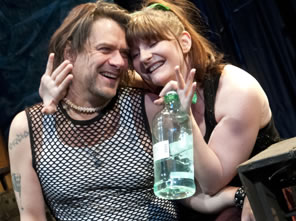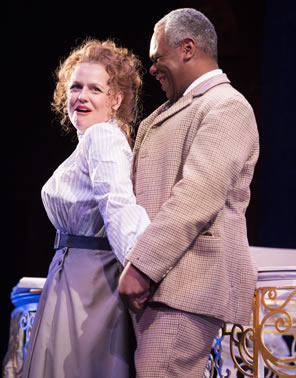An Interview with Olivia and Maria
[Return to previous page]
But, then, Maria has her own story.
She does. Maria is in the play much more to be there for Toby than she is to be there for Olivia, yeah.
Now, is that Maria's story, is that Toby's story, is that Aguecheek's story?
Wow.
Or is it Malvolio's story?
That's a good question. It's hard to know sometimes when you're in it because you feel like it's yours. [Laughs] Well, certainly Malvolio's story. Who are you meant to identify with in that plotline and walk away feeling for? Certainly it's, I think, Malvolio. I think. [Pause] I would say that's Malvolio's story.
I ask that because the very first Shakespeare I ever saw was Twelfth Night in the American Shakespeare Theatre up in Stratford, Connecticut, and Fred Gwynn played Toby Belch.
Oh, wow.
And I was a Munster's fan, so, for me, that was Hermann Munster up there. I fell in love with the play. Toby was always the key to that play for me, but then I have seen great Aguecheeks who totally dominate the comedy, I've seen Malvolios who totally dominate, I've seen Festes who totally dominate, I've seen Marias who totally dominate. So it's, whose play is this?
Yeah, it's a wonderful game of tennis between them. It can be very even, like I'll toss the ball to you and this will be your moment, because everybody in that plotline is given wonderful opportunities to do some really fun stuff.
You've got an extended scene with Feste.
I do.
You meet Aguecheek.
Yes.
So, as an actress, do you enjoy having all these different interactions with all these different people, and they're all pretty significant interactions?
I do. One of the things that happens when you're playing a supporting character in a Shakespeare play, especially in the comedies, is they get broken down into these little groups based on the subplots, and you can do an entire play without ever being on stage with half the cast. This one's not so much like that. The vast majority of my stuff is with Toby and Andrew and Olivia, but I get a few little moments with Viola and I have things with Feste, and I like that about this play, a lot. You're not just telling your tiny little story but you do string through the larger play.
Not many other Shakespeares that do that.
No, I think it's unusual in that way, especially in the comedies that characters are all so integrated with each other. I think the only person that I'm never on stage with is Antonio—the last scene, Antonio's actually on stage for that, so I guess that counts, too.
What about Orsino?
Well, I don't speak but I watch, I watch him a lot in act five.
So everybody's together for the last scene. And that's the way it should be.
Right. You can't have a nice dance if everybody's not on stage.


Two pairings of Maria and Toby: Jennifer Hopkins with Ian Armstrong in the Taffety Punk production of Twelfth Night (photo by Teresa Castracana) and Tonya Beckman with Craig Wallace in the Folger production (photo by Scott Suchman).
Going from Olivia to Maria, did you bring any perceptions of that—the Maria you had at Taffety Punk was a crazy lady?
Yes, she was.
Not at all somebody who'd be sailing on the Lusitania.
No, very different. It was a lot more about letting go any idea I had left over from the old show and unlearning everything I thought I knew about the play because the setting, the style, the time period are all completely different, so they are completely different people in a completely different society.
And the Olivia is completely different from your Olivia.
Completely. My Olivia was very broad, and the play itself was much broader than this version. This Olivia is, like I was saying, much more vulnerable and real and elegant.
This is going to be a comedy, isn't it?
It is going to be a comedy.
My biggest complaint with all the comedies, even Comedy of Errors, is some directors make them dark.
Yeah.
"There's a dark streak in there," they say, well fine, it's a streak.
It's a streak. Yeah, I hope it's just a streak. I agree with you. Twelfth Night can be really dark and I'm not sure I agree with that.
That's what I liked about Taffety Punk. It was so much fun, even though it was about death, even though it was a near-death experience, or she may have been dead: I didn't know through the play to the very end. But it was still funny.
I think that was something Michelle Shupe, who directed that, really wanted it to be. If it's her vision before death, what might that vision be? Is that vision going to be about death? Or is it going to be about life so can we make this as vibrant as we can?
Wish I thought about that before I wrote my review.
These things come to you later. They come to me later, too. After closing I go, "Oh, that's what that was about." [Laughs]
So nothing from the Punk production informed your Maria at all.
No. I would say there are choices I've made, some of which are similar to what Jennifer did, some of which are different, but they came from watching her. Whenever I'm playing a female character in a Shakespeare play, I get very curious about when they go silent—and they always do—and what that means. There's always some point in the play, and sometimes it's due to the cutting, but at some point they stop talking. Or it takes them a long time before they talk. And I'm always really curious about that, and that really informed Maria for me.
In what way? Where does she go silent?
She goes silent, at least in our cut this time—and I was looking at it this morning to see if she says much more, and she really doesn't say much more than what we're doing—when Toby says we're going to put Malvolio in a dark house, she has two more lines in the entire play. And I wondered what that was about. Because before that, with all the other plotting against Malvolio, it's like huge speeches of really relishing this punishment she's going to help mete out on him, and when Toby says that, she shuts up almost completely. So I had to make a decision about what that meant.
When does Olivia go silent?
She's silent more in the beginning. And she wasn't completely silent, she was terse and her lines were short at the beginning. And then when she meets Cesario, you can't shut her up. Then she has these huge passages.
So it could be just as informative that she doesn't go silent. That's a good point.
Yeah.
And you think about this woman. She's fallen in love with a guy, and this guy has not wanted her, and suddenly he's willing to marry her. Then she finds out he's a better guy than she thought he was—a real guy.
Yeah, he's actually a guy. [Laughs] There's a scene at the top of act five, and it's really just a matter of Shakespeare trying to get everybody on stage again, where Orsino's getting ready to leave and Cesario's chasing after him and then Andrew comes in and Toby comes in and Feste is there, and Olivia is responding to all of it in really short lines, like, "This is…" "What is…" "Why are you here?" "What's going on?" And I remember getting so frustrated with it because I was like, "I want everyone to leave and clear this stuff up with Cesario!" That is what I really wanted. But it's the end of the play and we have to wrap things up.
And actually she finds out she has the guy and the one she fell in love with in the first place is going to be her sister-in-law. Talk about a lucky break, she got it.
Yeah. She really escapes unharmed. [Laughs]
[To continue the interview, click here] [For a PDF of this interview, click here]



 Find additional Shakespeareances
Find additional Shakespeareances